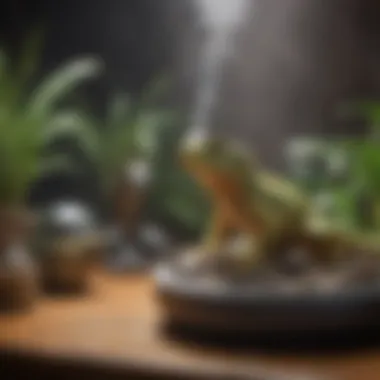The Importance of Humidifiers in Gecko Care and Habitat


Intro
Managing humidity is vital in the care of geckos. These reptiles originate from habitats with specific moisture levels, which are essential for their health and well-being. Understanding the role of humidifiers enhances the overall care provided to these pets. They help maintain a stable and appropriate atmosphere in their enclosures, thus preventing issues such as dehydration and shedding problems.
The biological needs of geckos dictate their living environment. When pet owners overlook humidity levels, they risk the health of their geckos. This article examines various types of humidifiers, best practices for their use, and potential challenges that might arise. We will provide insights to ensure a thriving habitat for your gecko.
Pet Care and Grooming
Importance of Regular Care
Regular care for geckos involves properly maintaining their habitat, including humidity levels. This ensures that they feel secure and healthy. When humidity fluctuates, it can lead to stress in geckos, affecting their overall health. Pet owners must check humidity levels daily.
Grooming Techniques by Pet Type
Grooming geckos may seem minimal compared to other pets, but it is still important. Regularly checking for skin health and cleanliness is essential. Ensure their environment is clean to prevent fungal and bacterial growth. For species like the Crested Gecko, ensure they have adequate places to climb and hide.
Tools and Products Recommendations
To maintain the right humidity levels, consider investing in:
- Digital hygrometers to monitor humidity accurately.
- Ultrasonic humidifiers known for their efficiency in reptile habitats.
- Misting bottles for manual humidity adjustments.
These tools can greatly enhance the living conditions for your gecko.
Seasonal Care Tips
During different seasons, humidity management may differ. In winter, use a humidifier more often as indoor air tends to be drier. Conversely, in summer, monitor humidity levels closely to prevent excess moisture which can be harmful. Adjusting care with changing seasons can significantly impact your gecko's health.
Health and Nutrition
Understanding Pet Nutrition
Geckos require a balanced diet tailored to their specific species. A diet lacking proper nutrients often leads to health issues. Supplements may be needed, especially for calcium and vitamins.
Common Health Issues by Species
Geckos can face various health issues, including:
- Dehydration: Often due to low humidity levels.
- Metabolic Bone Disease: Can result from poor nutrition.
- Respiratory Infections: Linked to improper humidity and temperature.
Preventive Care and Regular Check-Ups
Regular veterinary visits are crucial in proactively managing your gecko's health. Veterinary professionals can provide insights into nutrition, common illness prevention, and any habitat adjustments needed.
Food and Dietary Advice
Provide a variety of insects, fruits, and specialized gecko diets. It is essential to avoid overfeeding while ensuring a diverse diet that meets all nutritional needs. The right food fosters healthy growth and prevents dietary diseases.
Behavioral Training
Basics of Positive Reinforcement
Training geckos may be different from traditional pet training. Instead of commands, geckos can learn through sensory rewards. Positive reinforcement can effectively promote desired behaviors.
Training Techniques Users Can Apply
Utilize gentle handling techniques and provide treats when they exhibit positive interactions. This method encourages trust and comfort, essential for bonding.
Managing Behavioral Issues
Common behavioral issues arise from stress or environmental discomfort. If a gecko exhibits lethargy or hides excessively, re-evaluate humidity, temperature, and overall habitat conditions.
Importance of Socialization
Although geckos are generally solitary creatures, gentle handling can promote a sense of security. Regular interaction may help them become more accustomed to human presence, minimizing stress during care routines.
Engaging Activities and Enrichment
Fun Games to Play with Your Pet


While geckos do not play in the conventional sense, providing climbing structures and safe, engaging environments can stimulate their natural behaviors. Use branches and rocks to create a diverse habitat.
DIY Toys and Activities
DIY toys may include small tunnels or hides made from safe materials. These additions can create exploration opportunities that cater to their instincts while helping to maintain proper humidity levels.
Importance of Mental Stimulation
Maintaining mental stimulation is equally as important as physical care. Regular changes in habitat and the introduction of new hiding places prevent monotony, keeping geckos alert and healthy.
Outdoor Adventures and Exploration
Under controlled conditions, supervised outdoor exposure can expose geckos to natural sunlight and moisture, supporting their overall well-being. Always ensure safety from predators and harsh environmental fluctuations.
Resources and Community Engagement
Recommended Books and Websites
Refer to the following resources for further information:
Forums and Groups for Pet Owners
Engagement in communities, such as Reddit and Facebook groups, can provide valuable insights from other gecko owners.
Finding Local Services and Classes
Seek local exotic pet services that specialize in reptiles. Many places offer workshops or classes focusing on reptile care, contributing to better pet ownership practices.
Encouraging Community Sharing and Contributions
Sharing experiences with fellow gecko owners promotes a community of shared knowledge, benefiting all involved. Regular discussions on humidity management and habitat care can lead to improved practices and insights.
Adequate humidity is not just a luxury; for geckos, it is a basic requirement essential for survival.
Learning to manage humidity effectively paves the way for healthier geckos, ensuring a fulfilling experience for pet owners as well.
Understanding Gecko Humidity Requirements
Understanding the humidity requirements for geckos is fundamental in their care. Geckos, like many other reptiles, evolved in environments where humidity fluctuated based on their habitat. Without appropriate humidity levels, these creatures can face various health issues. It is significant, therefore, to cater to their specific needs based on species, as well as to their natural habitats.
The Natural Habitat of Geckos
Geckos can be found in a variety of habitats worldwide, from tropical rainforests to arid deserts. Each environment has its own specific humidity levels. In rainforests, for instance, humidity can exceed 80%. Conversely, desert-dwelling species might adapt to much lower humidity conditions that can drop below 20%. Understanding the natural habitat of the gecko species you own helps replicate an environment that mimics these conditions.
For example, the Leopard Gecko thrives in dry environments, while the Crested Gecko enjoys more humid conditions. This variation in habitat preference highlights the necessity of researching the specific humidity needs based on gecko species.
Importance of Humidity Levels
Humidity plays a vital role in gecko well-being. Proper humidity levels are crucial for multiple biological functions in geckos, including hydration, shedding, and digestion. Here are some specific aspects concerning humidity:
- Hydration: Geckos absorb moisture from the air through their skin. Low humidity can lead to dehydration, affecting their overall health.
- Shedding: Geckos need appropriate humidity levels to shed their skin correctly. If humidity is too low, retention of shed skin occurs, which can cause complications.
- Digestion: Humidity also affects digestion. If the air is too dry, it can hinder the process of food intake and digestion, leading to health problems.
In summary, understanding and maintaining the right humidity levels for geckos are not just beneficial but crucial for their care. Adequate humidity ensures a healthier, more vibrant pet. Therefore, integrating humidifiers in a gecko’s habitat can easily help achieve desired humidity levels.
Types of Humidifiers for Gecko Terrariums
Understanding the types of humidifiers suitable for gecko terrariums is crucial for optimizing their environments. Geckos rely heavily on humidity to maintain their health and well-being. The choice of humidifier can make a significant impact on these reptiles' comfort. Different types serve various needs. Knowing the distinct advantages and characteristics of each can help pet owners make informed decisions.
Ultrasonic Humidifiers
Ultrasonic humidifiers are popular for reptile enclosures due to their efficiency and effectiveness. They work by using ultrasonic misting technology to create a fine water vapor, which evenly distributes moisture throughout the terrarium. This type of humidifier is especially beneficial for maintaining precise humidity levels.
There are several key benefits to using ultrasonic humidifiers:
- Energy Efficiency: These devices generally consume less power compared to traditional models.
- Quiet Operation: They tend to operate silently, ensuring minimal disturbance.
- Adjustable Mist Output: Many ultrasonic humidifiers allow users to modify the humidity levels easily.
Pet owners should consider the tank size and how often it needs refilling. The frequency largely depends on the size of the terrarium and the specific humidity needs of the gecko species being kept.
Evaporative Humidifiers


Evaporative humidifiers function by drawing in air, passing it over a wet wick, and releasing the moisture back into the environment. They tend to be self-regulating, meaning they can automatically adjust to the humidity levels in the room. This can be advantageous in gecko care as it reduces the risk of over-humidification.
Some notable features include:
- Natural Humidity Regulation: These humidifiers can automatically adjust their output based on the ambient conditions.
- Larger Coverage Area: Evaporative models can effectively humidify larger enclosures.
However, it’s essential to ensure regular maintenance. The wick filter needs changing periodically to prevent mold growth, which can be harmful to the gecko's health.
Misting Systems
Misting systems are another effective option for maintaining humidity in gecko habitats. They are designed to spray water at regular intervals. This kind of system is especially useful for gecko species that thrive in consistently humid environments.
Benefits of misting systems include:
- Automated Operation: Many systems come with timers, allowing for scheduled misting.
- Consistent Humidity: They provide a steady supply of moisture, helping to stabilize the humidity levels.
- Ideal for Tropical Species: Particularly beneficial for geckos that require high humidity, such as the Crested Gecko.
While these systems can be more complex than others, they offer a level of convenience once properly set up.
Choosing the Right Humidifier
Choosing the right humidifier is crucial for the well-being of geckos in captivity. Optimal humidity is not just a preference; it is a necessity for their health, skin shedding, and overall vitality. An appropriate humidifier must align with the specific needs of the chosen gecko species and the size of the terrarium. This decision influences the creature's habitat, enabling appropriate temperature and moisture levels, which are independent variables affecting overall life quality.
Considerations for Size and Space
When selecting a humidifier for a gecko habitat, size and space become key considerations. The dimensions of the terrarium dictate the type of humidifier recommended. A small environment might benefit from a portable, compact ultrasonic humidifier, while larger setups might require something more robust, like an evaporative model. A humidifier that is too small will struggle to maintain appropriate humidity, while an oversized unit could lead to excessive moisture and potential health risks for the gecko.
It is advisable to measure your terrarium’s dimensions beforehand. Make sure to determine both the height and width, along with any decorations or furniture present that may obstruct airflow. Remember to ask several questions:
- What's the total volume of the terrarium?
- How much space can I dedicate to the humidifier?
- Are there any specific areas where humidity is needed more?
When it comes to space, consider inlet and outlet positioning; this will affect how well humidity circulates throughout the habitat. This ensures moisture reaches all parts of the gecko's environment effectively.
Assessing Humidity Needs of Specific Gecko Species
Not all geckos share the same requirements when it comes to humidity. Each species has evolved to thrive in specific environments that dictate their hydration levels. For instance, leopard geckos are more arid-dwelling and may require less humidity than crested geckos, who thrive in a humid climate. Understanding these distinctions is key for selecting the right device.
- Leopard Geckos: Prefer low humidity ranges of 20-40 percent.
- Crested Geckos: Thrive in higher humidity of 50-70 percent.
Research the needs of your specific species before setting up a humidifier. Devising a routine to monitor humidity levels can help. A digital hygrometer is a valuable tool for this. By collecting data on humidity fluctuations throughout the day, you can adjust your humidifier settings accordingly.
Noise Levels and Maintenance
One cannot overlook the noise factor associated with different humidifiers. Some units can be remarkably loud, potentially stressing both the gecko and its owner. Therefore, research noise levels, particularly if the terrarium is situated in a living area where tranquility is valued. Ultrasound humidifiers tend to be quieter in operation.
Additionally, regular maintenance is vital for hygienic operation. Cleaning the humidifier prevents mold and bacteria growth, safeguarding the health of your gecko. Here are some helpful maintenance tips:
- Cleaning frequency: Clean weekly to reduce the risk of contamination.
- Use distilled water: It can help minimize mineral buildup inside the unit.
- Check parts regularly: Ensure that all components are functioning correctly.
Following these guidelines will not only help maintain a healthy environment but will also prolong the life of the humidifier, ensuring it remains an effective tool in your gecko care arsenal.
Regular maintenance enhances functionality and promotes a healthier habitat for your pet gecko.
Best Practices for Using Humidifiers
Using a humidifier correctly is crucial for maintaining a suitable habitat for geckos. Proper humidity levels can affect their overall well-being and health. Understanding the best practices helps pet owners create an environment that mimics their natural habitat effectively. This section outlines essential strategies to ensure the humidifier functions optimally and supports the geckos' needs.
Setting Up the Humidifier
When setting up a humidifier, location matters. Place the device in an area where it can distribute moisture efficiently throughout the terrarium. Avoid direct contact with the substrate, as excessive moisture can lead to mold growth. It is also essential to select a humidifier model suitable for the size of the tank, ensuring adequate moisture without creating a steamy environment that can overwhelm your geckos.
Additionally, consider the type of water you use. Distilled or filtered water is preferable, as it reduces mineral buildup that can harm the humidifier over time. Ensure that the humidifier is easily accessible for cleaning and refilling.
Monitoring Humidity Levels
Monitoring is key to maintaining the right environment for your geckos. Use a hygrometer to gauge humidity levels regularly. Ideal humidity varies among species but typically ranges from 40% to 70%. Keeping track of these levels will assist in preventing both low and high humidity situations that can stress geckos.
A digital hygrometer may provide more accurate readings than analog ones. Placing sensors at multiple points within the tank can offer a comprehensive view of humidity distribution. Keeping a log of these readings can also help identify patterns and necessary adjustments over time.
Preventing Over-Humidification


While humidity is beneficial, too much moisture can pose risks. Over-humidification can lead to respiratory issues and promote mold growth in the terrarium. To prevent this, establish a schedule for running the humidifier, adjusting it based on real-time humidity readings.
Limit the duration and frequency of humidifier use. Consider using a timer or a humidistat, which automatically regulates humidity levels by turning the device on and off as needed. In addition, provide adequate ventilation in the tank. Utilizing a fan or ensuring there are proper openings can help regulate excess moisture, creating a more balanced environment.
Key Point: Regular maintenance of humidifiers and continuous monitoring of humidity levels are fundamental for ensuring a healthy habitat for geckos.
By adhering to these best practices, pet owners can better support the health and happiness of their geckos, allowing them to thrive in a carefully maintained environment.
Potential Challenges with Humidifiers
In the realm of gecko care, utilizing humidifiers can be a powerful practice to maintain the necessary humidity levels. However, while they offer significant advantages, they also present certain challenges that pet owners must address. Understanding these challenges is essential for creating a healthy habitat for geckos. Recognizing possible pitfalls can lead to better management and ultimately improve the living conditions of these reptiles.
Common Issues with Humidifiers
Humidifiers are not without their issues. Some of the common concerns include:
- Ineffective Humidity Control: Insufficient humidity can occur if the humidifier is not powerful enough or incorrectly set. This can lead to health problems for geckos.
- Over-Humidification: Excessively high humidity can cause mold and bacterial growth, posing risks to both geckos and their handlers.
- Clogging and Maintenance Needs: Mineral deposits from water can quickly clog humidifiers, degrading their performance. Regular cleaning is necessary to avoid these problems.
- Noise Production: Some humidifiers, especially older models, can be noisy, disturbing both the geckos and their owners.
These issues highlight the need for careful consideration when selecting a humidifier and monitoring its performance in the terrarium.
Maintaining Equipment Functionality
To ensure a humidifier operates effectively, regular maintenance is crucial. Here are some key pointers:
- Regular Cleaning: Routine cleaning prevents mineral buildup, ensuring the humidifier works properly. Following the manufacturer’s guidelines for cleaning is important.
- Monitor Water Quality: Using distilled water can reduce mineral deposits in the machine. Tap water may contain minerals that can clog humidifiers over time.
- Check for Wear and Tear: Periodically examine hoses and filters to make sure they are functioning properly. Replace them as needed to avoid performance issues.
- Test Humidity Levels: Utilizing a hygrometer can help track humidity levels accurately. Regularly check to confirm the humidifier is maintaining the desired environment for geckos.
By taking these steps, pet owners can mitigate challenges associated with humidifiers and ensure they serve their intended purpose.
Alternative Humidity Solutions for Geckos
Managing humidity effectively is crucial for the health of geckos. While humidifiers are a popular way to regulate humidity in terrariums, alternative methods can also provide adequate moisture levels. Understanding these options can enrich the habitat for geckos and present more adaptable solutions for pet owners.
Natural Humidity Sources
Natural sources of humidity can play a significant role in maintaining moisture in a gecko's environment. These sources mimic the gecko's native habitat and can lead to healthier, more active reptiles. Some effective natural methods include:
- Water bowls: Placing a shallow water bowl inside the terrarium can create humidity through evaporation, especially in warm environments.
- Live plants: Utilizing live plants can enhance humidity levels. Plants like pothos or ferns are great for terrariums as they not only retain moisture but also offer hiding spots for geckos.
- Substrate choice: Using a substrate that retains moisture, such as coconut coir or sphagnum moss, can help maintain humidity levels and provide a comfortable environment for geckos.
Utilizing these natural sources requires minimal maintenance and aligns with a more holistic approach to gecko care. It is not always necessary to rely on mechanical options when nature can provide so effectively.
DIY Misting Techniques
Creating a humidity-rich environment does not have to be complicated or expensive. DIY techniques can provide an effective solution for gecko owners. Consider these simple methods:
- Hand misting: Regularly misting the terrarium with a spray bottle can instantly increase humidity. This method allows for direct control over moisture levels and can be adjusted based on environmental conditions.
- Low-tech misting systems: Setting up a basic drip system using a water bottle can provide a more constant source of moisture. This setup can be directed towards specific areas in the terrarium where geckos might spend the most time.
- Humidity gauges: Incorporating humidity gauges can help monitor levels effectively. This is essential for adjusting misting frequency, whether handheld or system-based.
Using DIY techniques can empower pet owners to manage and experiment with humidity levels more freely. This hands-on approach adds a personal touch to gecko care and creates a deeper connection between the owner and the pet.
Creating a balanced environment for your gecko is not just about humidity; it's also about replicating their natural conditions as closely as possible.
Overall, alternative humidity solutions for geckos are practical and pragmatic options that can lead to a healthier habitat. By understanding the importance of these methods, owners can ensure their pets thrive in a setting that closely resembles their natural environment.
The End: Importance of Humidity in Gecko Care
One fundamental key point is that geckos have specific humidity requirements based on their species and natural habitat. Ensuring the correct balance of moisture allows geckos to thrive, facilitating vital processes like shedding and digestion. Conversely, inadequate or excessive humidity can lead to stress, respiratory issues, and even illness.
Moreover, the selection of the right humidifier is crucial for creating the desired environment. Various types, including ultrasonic, evaporative, and misting systems, each present unique advantages and challenges. Understanding the differences helps owners make informed decisions tailored to their gecko's needs.
Critical to effective humidity management is the implementation of best practices. Regular monitoring of humidity levels, along with proper setup and maintenance of humidifying equipment, can help prevent complications. Knowledge about common challenges, such as over-humidification, further contributes to successful care.
"Carefully managing humidity levels is not merely a luxury but a necessity in ensuring the health and longevity of geckos."
Ultimately, the incorporation of appropriate humidity solutions and ongoing awareness can enhance the habitat immensely. When pet owners prioritize these aspects, they advocate for their gecko's health and create a thriving environment for them.
Summary of Key Points
Several important aspects regarding humidity and gecko care have come to light in this article:
- Geckos require specific humidity levels for healthy functioning.
- Different types of humidifiers cater to various needs and spaces.
- Application of best practices is essential to avoid common pitfalls.
- Regular monitoring and adjustments can enhance habitat conditions.
- Knowledge of potential challenges aids in proactive care.
By focusing on these key points, pet owners can make informed choices about the humidity needs of their geckos.
Advocating for Proper Care
- Invest time in research: Each species of gecko has unique needs. Familiarize yourself with these requirements to better support your pet's health.
- Utilize appropriate tools: Invest in reliable humidifiers and monitoring tools to maintain proper humidity levels.
- Engage with the community: Join platforms such as Reddit or relevant Facebook groups to share experiences and gather insights.
- Continuously educate yourself: Keeping informed about best practices and new developments in reptile care supports the well-being of your gecko.
Ultimately, fostering a supportive and healthy environment encompasses understanding, commitment, and proactive care. By advocating for the right humidity management practices, you ensure a better quality of life for your gecko.















